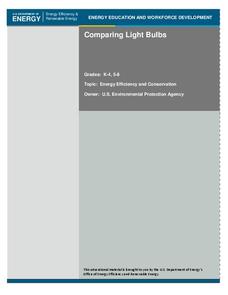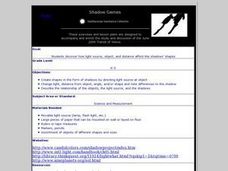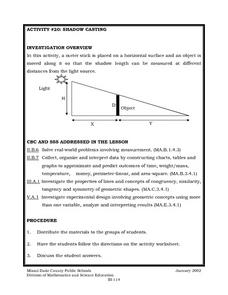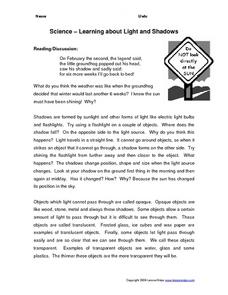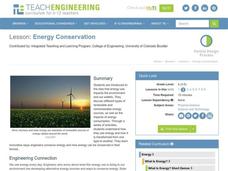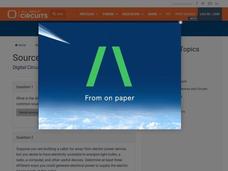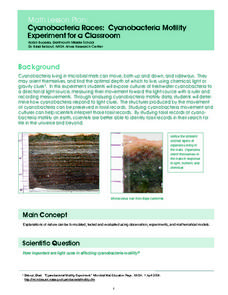Curated OER
Comparing Light Bulbs
An average home produces twice as many emissions as an average car. Teach your class how to reduce energy consumption by replacing standard incandescent light bulbs with compact fluorescent light bulbs. Perform an experiment to compare...
Teach Engineering
Light Intensity Lab
Let there be light. The last installment of a seven-part series has pupils conduct an experiment on light attenuation through different numbers of transparency sheets. They then relate the results back to how X-rays measure bone density.
Curated OER
Wavelengths of Light
Explore physical science by participating in a visual spectrum experiments. Budding scientists identify the colors in the color spectrum and view the colors in class by utilizing cellophane, flash lights, and other arts and crafts...
Curated OER
Shadow Games
Students create different shapes by putting light on different objects. They change the distance from the object, the light source and angles to make the shadows different. They are to describe the relationship between the light, object...
Curated OER
Diversity of Colors
Young scholars investigate color diversity by experimenting with jelly beans. In this color spectrum lesson, students observe colored jelly beans through different filters and light sources to change the existing look of the bean....
Mathematics Assessment Project
Deducting Relationships: Floodlight Shadows
Try to figure out what happens with shadows as a person moves between two light sources. A formative assessment lesson has individuals work on an assessment task based on similar triangles, then groups them based on their...
PBS
Scale City — Inverse Proportions and Shadows in the Real World
Bring the resource out from the shadows. Viewers of a short video learn about drive-in theaters and how operators project images onto a large screen. They then perform an experiment to determine the relationship between the distance of...
Curated OER
Shadow Casting
Eighth graders use a meter stick that is placed on a horizontal surface and an object is moved along it so that the shadow length can be measured at different distances from the light source. They solve real-world problems involving...
Curated OER
Science--Learning About Light and Shadows
In this light and shadows instructional activity, learners find 5 transparent items and 5 opaque items from the classroom and categorize them underneath their appropriate headings. Students look at 4 boxes with shadows and draw a little...
Curated OER
Energy Conservation
Students investigate energy conservation. In this energy conservation and analyzing data lesson, students identify and explain several energy sources and research renewable and nonrenewable energy sources. Students use statistics...
Curated OER
Make a Solar Oven
Students build a solar oven. For this Science lesson, students construct a functional solar oven. Students design the oven and explain the energy concepts involved.
Curated OER
Intensity of Light
High schoolers discover the relationship between the brightness of a light and the distance from the light. They identify two different ways of looking at the brightness of a light, how luminous light is and how illuminated an object is....
California Academy of Science
Greening Your Middle School
Middle schoolers redesign their school to make it more energy efficient, and create a model of their design. Learners get together in groups of 5, and they take on the task of making their school more energy efficient. To do this, they...
Curated OER
Sources of Electricity
In this online electricity worksheet, learners are asked 10 questions about electric current and battery energy, an online answer key provided.
Curated OER
Saving Money Through Mathematics
Third graders discuss light sources and collect data about energy sources. They compare data and create a multiple line graph showing energy used by light sources for each student in the group. They present their graphs and write a...
Curated OER
Spitzer Explores a Dusty Young Star
In this stars instructional activity, high schoolers read about the Spitzer space telescope and they solve 5 problems about the mass, size, and power of dust grains and interstellar mediums detected by the telescope.
Curated OER
Get the Picture!
Astronomers practice downloading data from a high-energy satellite and translate the data into colored or shaded pixels. As a hands-on activity, they use pennies to simulate high-energy satellite data and they convert their penny...
Curated OER
Cyanobacteria Races: Cyanobacteria Motility Experiment for a Classroom
Students experiment to determine the effect of light on cyanobacteria movement. They graph the data of the experiment for further analysis. They watch a time-lapse video of cyanobacteria motility at a NASA website.
Curated OER
How Much Does it Cost to Light Your School?
Students explore the cost of electricity used to light their classrooms. They compute the cost of electricity as well as the number of kilowatt hours of electricity used during the school year. Students compute the number of tons of coal...
Curated OER
Energizing Our School
Students explore energy usage in home and in school. They examine the types of non-renewable sources and discover alternate sources of energy. Through group activities, students calculate the perimeter and area of a given room. They make...
Curated OER
Focusing Light With a Lens
Students experiment with a converging lens. They observe the image of an object through a lens. They determine the magnification of the lens.
Curated OER
Squares in the Light
Young scholars collect and analyze data using a graph. In this algebra lesson, students explain their findings orally and with a graph. They use their knowledge to solve real life scenarios.
Teach Engineering
Bone Mineral Density Math and Beer's Law
Hop into a resource on Beer's Law. A PowerPoint presentation introduces Beer's law as part of calculating bone density from X-ray images in the sixth lesson plan in the series of seven. Individuals work on practice problems with this law...
Curated OER
Completing the Circuit
Learners use a battery, wires, small light bulb and a light bulb holder to learn the difference between an open circuit and a closed circuit, and understand that electric current only occurs in a closed circuit. They describe the...
Other popular searches
- Natural Light Sources
- Sources of Light
- Science and Light Sources
- Science Light Sources
- Childrens Light Sources
- Alternative Light Sources
- Man Made Light Sources
- Secondary Light Sources
- Chileans Light Sources
- Children's Light Sources
- Chilrens Light Sources
- Natural Sources of Light
